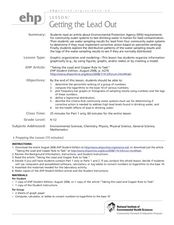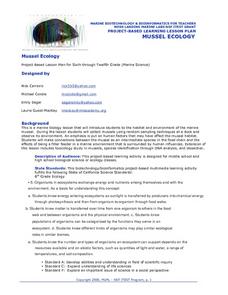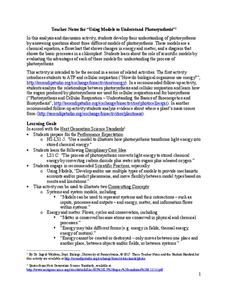Curated OER
Unit Plan Template
Learners research the adaptations of desert animals and build their research skills. In this the adaptations of desert animals activity, students describe major factors that desert animals have on their habitat. Learners...
Curated OER
Building a Bird's Nest
Students identify local birds and their habitats. In this wildlife lesson, students list various birds that live in their area and match the descriptions of the birds to the photos. Students build a diorama of a birds nest.
Curated OER
Science- Unit on Matter- Liquids-
Second graders discover that everything is made of matter. they determine the properties of liquids and that like solids, liquids can be grouped or classified according to properties or qualities. they assess that solids have a definite...
Curated OER
Science- Unit on Matter- Solids
Second graders identify and describe properties of matter.
They identify three forms of matter- solids, liquids, and gases with 100% accuracy. The student describes the properties of solid objects.
Curated OER
Science: Floating and Sinking Objects
Second graders discuss why some objects float while others sink. They examine various objects and predict whether or not they will sink or float. Students discover the properties needed for objects to float.
Curated OER
Science: Solids
Second graders investigate the properties of solids and discover how to classify them. Using rulers, they measure various solids on display. In groups, they play an identification game where one students names a location, such as the...
Curated OER
Getting the Lead Out
The article for this lesson no longer accessible through the links in the lesson plan, but can be found in the National Center for Biotechnology Information website. After reading it, environmental science students answer questions and...
Curated OER
Apple Energy
Ninth graders evaluate the energy associated with the production of five different forms of apple products. They develop a poster to advertise one of the five apple products to the class. Students provide additional examples of consumer...
Curated OER
How Can You Tell One Clear Gas From Another?
Fifth graders perform experiments to determine the identity of an unknown gas sample. In this chemistry lesson, 5th graders fill balloons with air, oxygen, hydrogen, and carbon dioxide. They use mass and reactivity to identify the gases.
Curated OER
Mussel Ecology
Students are introduced to the marine environment of the mussel. The emphasis of the lesson is upon what human factors are present to influence the environment in positive and negative ways. They brainstorm in groups in order to conduct...
Curated OER
Plate Tectonics & Land Forms
Fourth graders discuss the different interactions of plates and the ways mountains are created. In this plate tectonics lesson students complete an activity in groups.
Curated OER
Pre-Activity Worksheet: Natural Selection
Although the instructions include reading from a specific textbook, the tasks are appropriate for any unit dealing with how genotype frequency changes over time. Junior biologists define five vocabulary terms and then answer five...
Community Resources for Science
A Whole New World of DNA and Proteins
Lead your young scientists into an exciting world as they participate in a role play and experiment focused on proteins and DNA. After researching the Central Dogma of Biology, individuals or groups participate in a classroom...
Curated OER
Math for the Frontier
Make history come to life by using the Frontier House series to engage students in the past. Your class will "prepare" for a trip to 1833 Montana. They will learn about homesteading, frontier life, inflation, and cost of living. Using...
Curated OER
Introduction to Film Editing
Editing is a major part of making an amazing film. Young film makers examine a clip from the movie Citizen Kane. They then discuss two editing techniques and examine them in other films. They write out short scenes, film them, and then...
Serendip
Using Models to Understand Photosynthesis
Is your class in the dark about photosynthesis? Shed some sunlight on an important biological process with a thoughtful activity. After answering questions to help determine their level of knowledge, learners work with chemical equations...
Forest Foundation
The Nature of Trees
Young botanists examine the different parts of tress and then draw parallels between the functions of these parts and the function of parts of the human body.
Curated OER
The Next Logical Step in Astronomy
Students research future astronomy endeavors and how the exploration with contribute to astronomy and humanity. In this astronomy lesson plan, students research, present, and debate the topics as a class.
Curated OER
The Hall of Physicist
Students study the history and scientific contributions of Albert Einstein. In this Albert Einstein lesson plan, students learn his history, research his scientific contributions, create a timeline of him and his work, and create a...
Curated OER
Water Cycle and Its Movement in the Soil
Learners are introduced to the water cycle and water movement in soil. In this water cycle lesson, students explore how water moves through the water cycle and discuss water sources, natural reservoirs, soil...
Curated OER
Global Warming Statistics
Students research and collect data regarding temperature changes for a specific location and find the mean, median, and mode for their data. In this climate change lesson, students choose a location to research and collect data regarding...
Curated OER
Summer
Students discover different uses of water. They discuss what lives in water and what does not. They match numbers 1-5 with objects of correct amount and recognize 5 different colors. They pick from pictures of different ways water...
Curated OER
This Can't be a Plant
Learners grow mold. In this science experiment lesson, students grow mold on different pieces of bread by adjusting the moisture, temperature, and light. They record the results to see which grows the most mold.
Curated OER
Influential Scientists Vocabulary Quiz
In this science vocabulary worksheet, students match the names of 19 science professionals with the definition. Example: Ichthyologist (studies fish).























